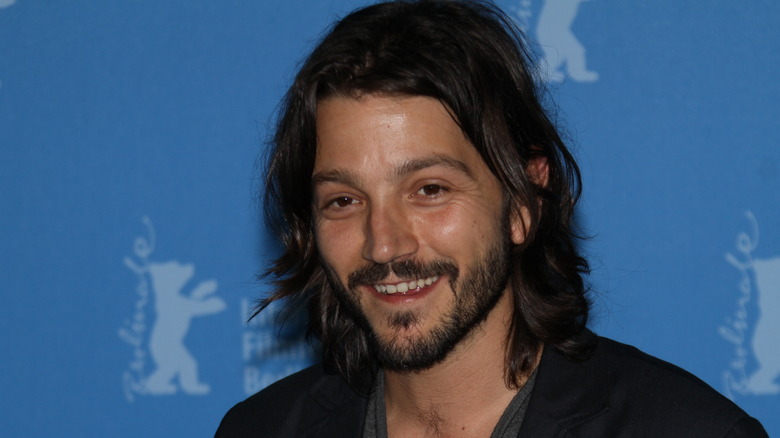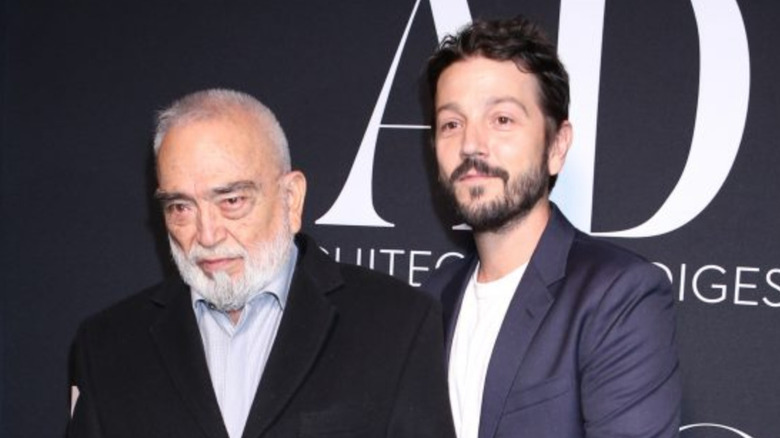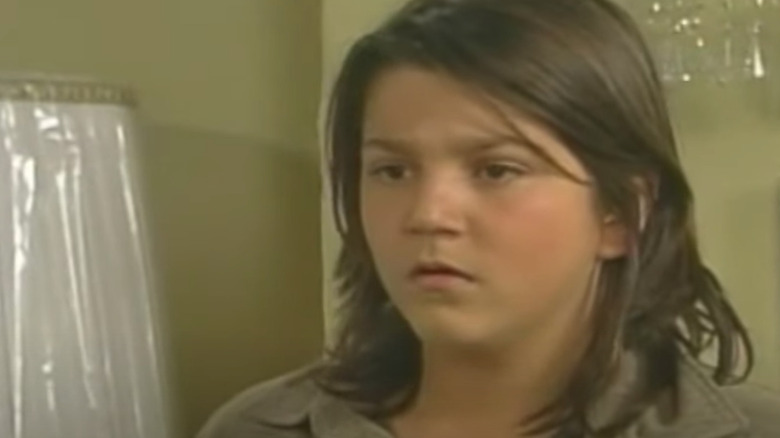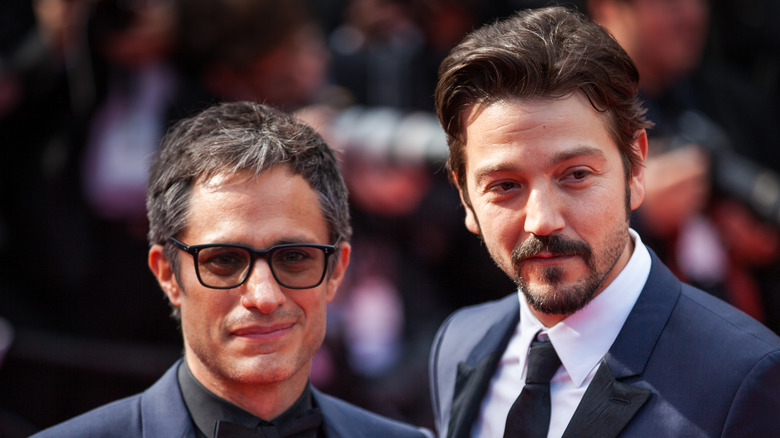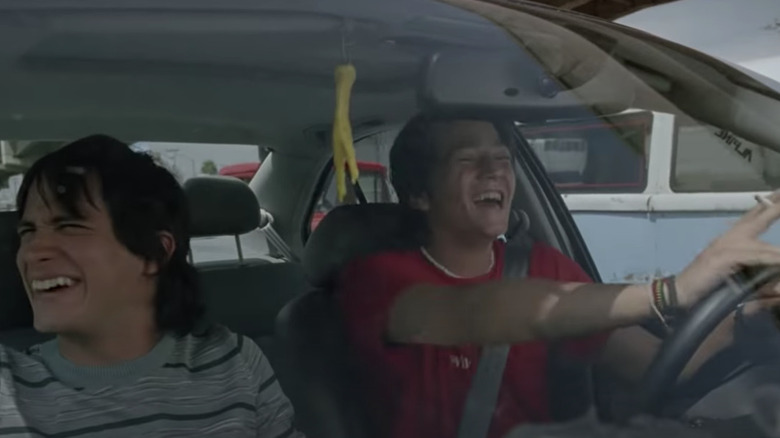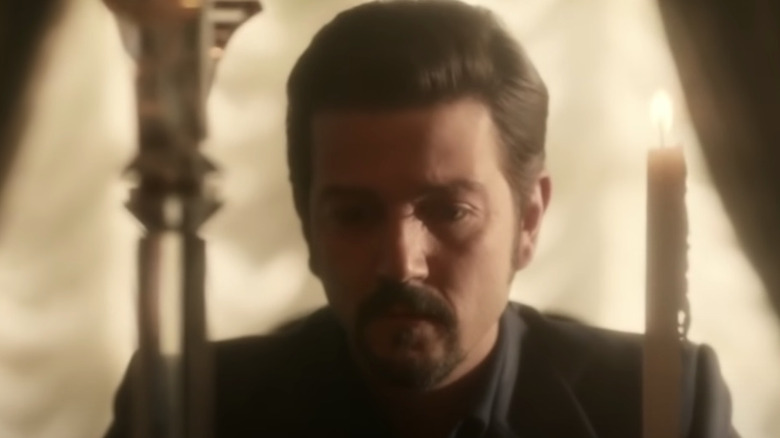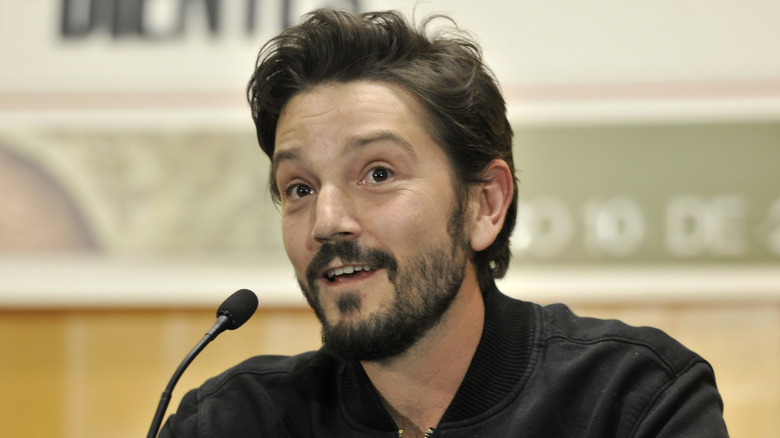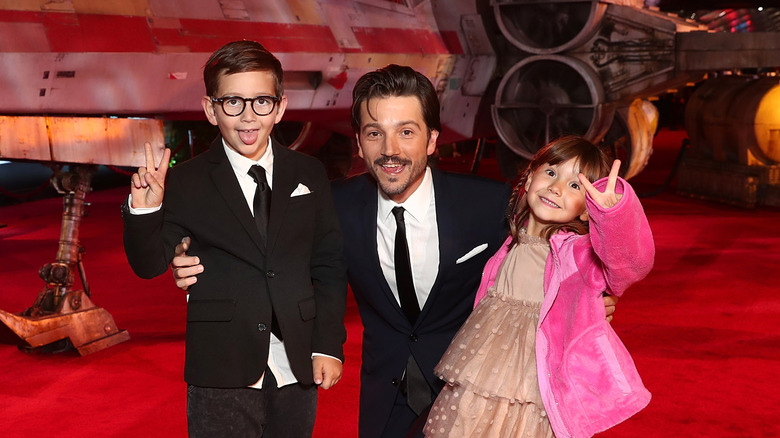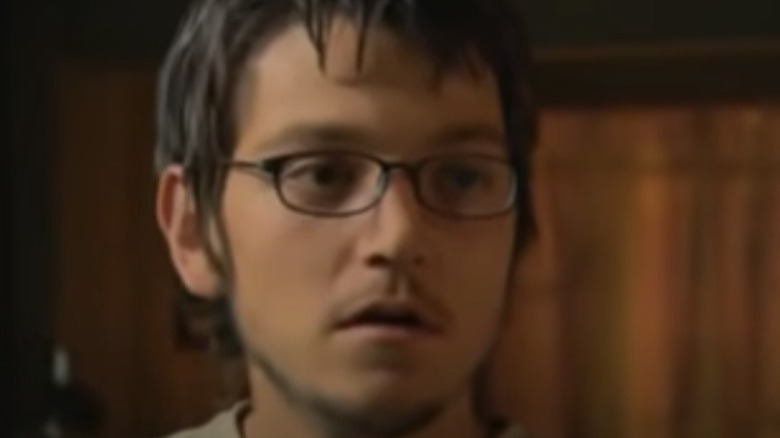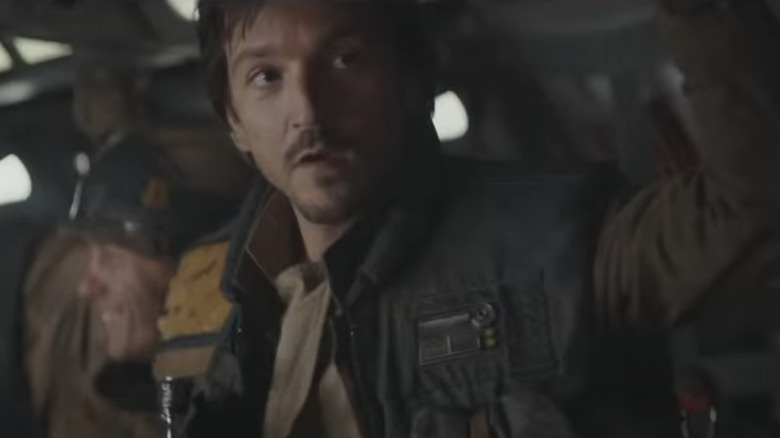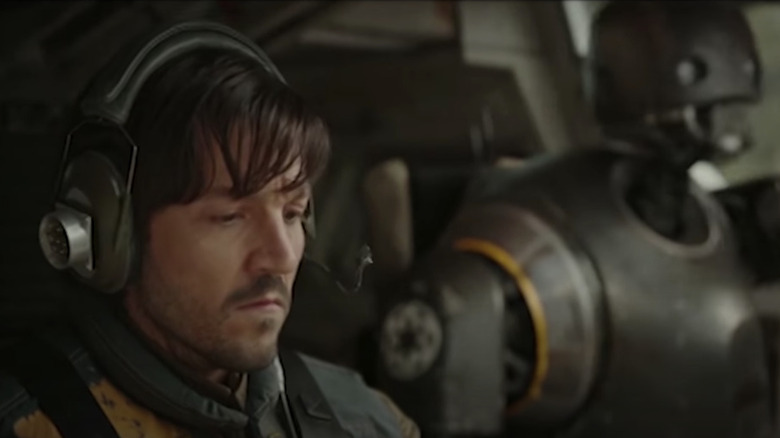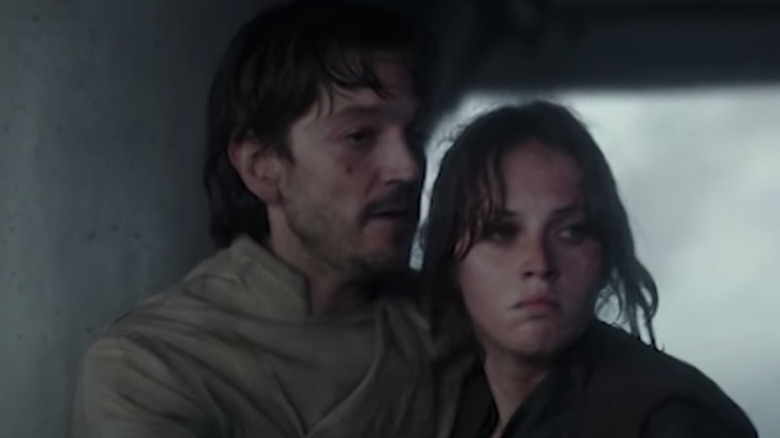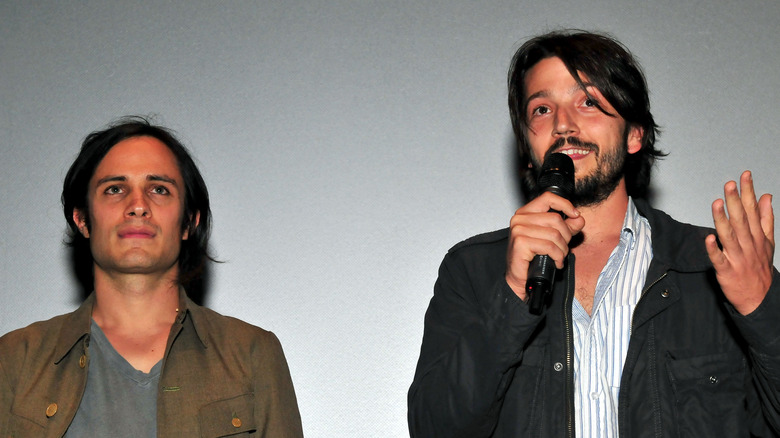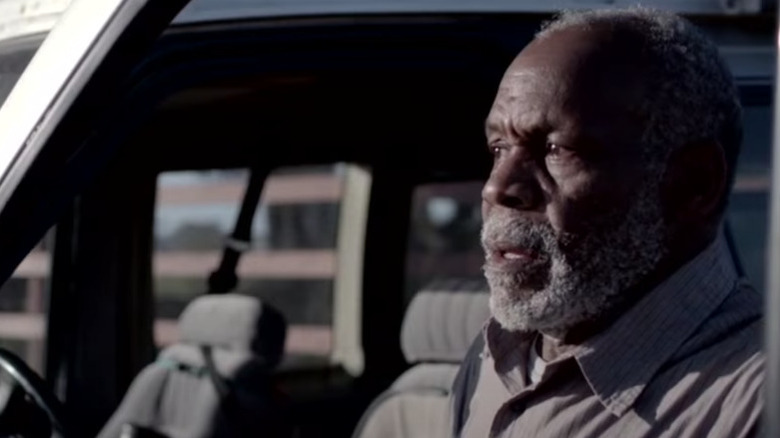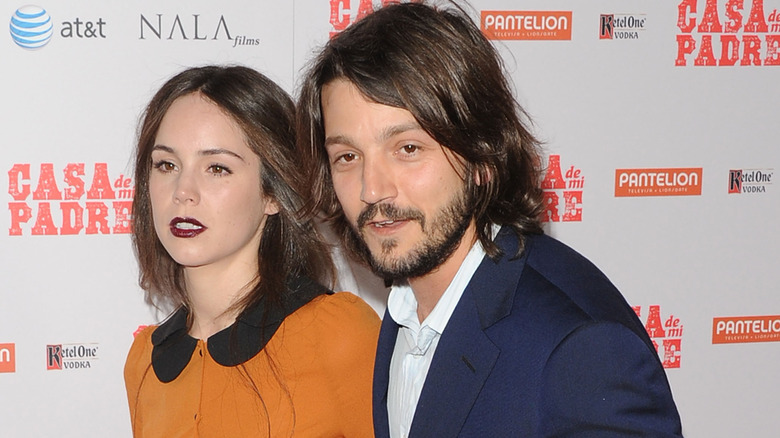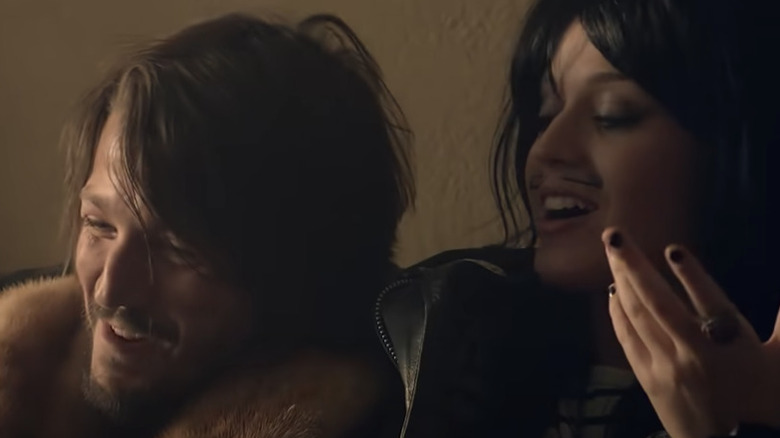The Untold Truth Of Diego Luna
Diego Luna first made a mark on the international film scene with his unforgettable role alongside his real-life best friend, Gael García Bernal, in Alfonso Cuarón's road trip classic, "Y tu mamá también." The Mexican actor had already found fame back home in the world of telenovelas, but "Y tu mamá también" launched him into a new type of stardom. The film also marked the first of several collaborations with García Bernal, as the two friends started working together both on and off screen.
Following "Y tu mamá también," Luna appeared in a string of high-profile films: Julie Taymor's "Frida," Steven Spielberg's "The Terminal," and a starring role in "Dirty Dancing 2: Havana Nights." While he's recognizable for his boyish charm and lightheartedness, Luna has gone to surprising places with heavier roles, such as cartel leader Félix Gallardo in "Narcos: Mexico," and a grieving husband opposite Sienna Miller in "Wander Darkly."
While Luna's career has mostly been in indie films and TV, he moved into the super mainstream as Cassian Andor in "Rogue One." Luna was the first prominent Mexican character in the "Star Wars" universe, and luckily for fans, he will reprise this historic role in the upcoming Disney+ series, "Andor." Luna's career has defied expectations as he's evolved from his teen heartthrob days, and his personal life offers surprises as well. Here's the untold truth of Diego Luna.
He was raised by his artistic dad
Luna's British mother, Fiona, was a costume designer who tragically died in a car accident when he was just two. In an interview with C Magazine, Luna describes his mother's impact on his life: "She was beautiful and full of energy and passion for her work, so she left a nice print on the Mexican theater community. I guess that's why I started working in theater: I felt her warmth around me." Fiona's legacy lives on today through Luna's daughter, whom he named after her.
Luna's father, Alejandro, is a set designer and former director of the theater program at the Universidad Nacional Autónoma de México, who introduced Diego to the arts from a young age. With both of his parents deep in the theater world, perhaps it's no surprise that Luna found his home on stage. In a profile by the LA Times, Luna notes that he saw the theater as a way of connecting with his father. He acted in his first play when he was seven, which began his long career of continuing his family's legacy in the arts.
He started as a telenovela star
While Luna's acting career began in the theaters where his father worked, it really took off when he was a young teen and nabbed a role alongside Gael García Bernal in the television series "Mi abuelo y yo." Luna later appeared in the telenovela, "El premio mayor," where he played Quique, the son of the series' protagonists, Carlos and Laura. According to the LA Times, Luna's teenage work in telenovelas enabled him to become financially independent by 18 and live on his own.
Luna has joked about his telenovela experience preparing him for the Cassian Andor television series and said that there will be a melodramatic crying scene between him and K-2 (via Hola). Joshing aside, Luna's connection to telenovelas runs even deeper. His ex-wife, Camila Sodi, is the niece of Thalía Sodi, the Mexican actress and singer who's known as the "Queen of the Telenovelas" for being one of the most popular Spanish-language soap stars in the world.
He's known Gael García Bernal since they were babies
It's hard to think of Diego Luna without thinking of his best friend, Gael García Bernal. These friends go all the way back to infancy. Luna and García Bernal's mothers were close friends who worked together in costume design. Luna was born a year after García Bernal and met him when he was just a few days old. Luna has said his friendship with García Bernal solidified when the two did a play together when he was eight. As he says, "theatre was what we enjoyed the most — improvising and inventing stories."
García Bernal told The Independent that "Diego has always had this beautiful energy about him. Even as a child he was such an intelligent and loving person." In the same interview, Luna notes that there are parallels between acting and friendship: "communicating, reacting and sharing." He and García Bernal can engage with these elements both professionally and personally, which enhances their work. Their friendship certainly pays off, as seen in films like "Y tu mamá también" and "Rudo y Cursi." We look forward to seeing what the two do next.
He wasn't the top choice for "Y tu mamá también"
For many fans, what makes "Y tu mamá también" stand out is the friendship between Tenoch (Luna) and Julio (García Bernal), which feels so real because it encompasses love, pain, jealousy, and intimacy. Of course, part of the success of this portrayal comes from Luna and García Bernal's real-life friendship, but Cuarón initially had very different plans for this buddy movie.
Luna reveals to Today that Cuarón was hesitant to cast him in "Y tu mamá también" because he wanted to find an unknown actor and Luna was already a well-known soap star. After a long and arduous casting process, Cuarón finally landed on Luna, who jokes, "It was great to know at least that he went through every actor in Mexico and wanted me...you think I'm the best option, great!" In fact, it was García Bernal who convinced Cuarón to consider Luna for the role, arguing that their lifelong friendship would only help the film. He was right about that; it's difficult to imagine "Y tu mamá también" without the openness and trust these two actors bring to the screen.
He was nervous to take a role in "Narcos: Mexico"
One of Luna's more memorable roles is on "Narcos: Mexico," where he plays real-life cartel boss Félix Gallardo, one of the founders of the Guadalajara cartel. Luna was anxious about depicting the very real violence of Mexico, as Hollywood can either glorify or vilify it. As he noted to C Magazine, the producer of "Narcos: Mexico" convinced him to take on the role by highlighting the importance of telling this story so that people understand "what needs to happen for cocaine to reach your wallet." Luna's work as Gallardo has mesmerized audiences.
In an interview with Trevor Noah, Luna elaborated that the public must understand the nuances and complexities of Mexico's drug trade for change to happen. The issue is the market, not the traffickers that cater to it. In another interview with Conan O'Brian, Luna notes that the power of "Narcos: Mexico" goes behind the scenes, since the series films all around Mexico, showing both the diversity of the country and its talent. It wasn't until he worked on this show that he realized how much has to be done to fix the drug war issue, and he's understanding it more as the timeline of the show catches up to the present.
He moved back to Mexico to support his homeland
"Y tu mamá también" made Luna a hot commodity in Hollywood and opened up doors all around the English-speaking world. Around that time, Luna moved to LA to focus on his career. A few years ago, he moved back to Mexico, returning to the house he bought at 21. As Luna tells the LA Times, he wanted to get more involved with activism in his homeland: "I don't want my kids to see me looking at the news from my living room in LA, complaining about what's happening in Mexico. I want them to see me here, fighting for something I love." Luna describes the experience of being in LA as "cold," as it can invite you in but deny you intimacy.
Since moving back to Mexico, Luna has done local theater work, starring in a play about internet surveillance called "Privacidad," which gave him the opportunity to interview Edward Snowden. A pragmatist, he's interested in seeing results from his activism, so he and García Bernal created a relief fund in 2017 following a tragic earthquake in Mexico. Luna's work moves through various spheres of acting and activism, and he's continued working in Hollywood as well.
He wants his kids to have a different childhood
Luna's childhood was unique, as he grew up in the theater with his father. In fact, he made his acting debut at 7 in a play where he had "to walk back from the stage to the front with a flower in my hand and give it to someone in the audience. Naked." An omen for the nudity to come in "Y tu mamá también," perhaps?
Luna is now father to two kids with his ex-wife, Camila Sodi. Part of his desire to return to Mexico was to let his kids (Jerónimo and Fiona) grow up there. As he tells the LA Times, he and Sodi have agreed on the approach of letting their kids be kids for as long as they can. That's a bit different from Luna's own childhood, where he was "already trying to be an adult" as a child in the theater world. Luna was famous by the time he was a teenager, so he and Sodi want their kids to live a slower life than he did.
He's vocal about the differences between American and Mexican film
The appeal of returning to Mexico for Luna isn't just a personal connection to the stories he can tell, but also a freedom to make any project he wants — a freedom that doesn't exist in Hollywood. He told the LA Times, "It's hard to find someone who will tell you no [in Mexico], versus in the States, where it's no after no after no after no." Projects in Mexico aren't made just to make money, which allows for playfulness in the approach and content. Luna has first-hand experience with this on both sides of the camera, as he directed the 2014 feature "Cesar Chavez," which was filmed in Northern Mexico.
Luna has long noted the difference between the Mexican and American film industries. In a 2004 interview with the San Diego Union-Tribune, Luna discussed the difficulty of making a movie in Mexico, where one can't make a living off of it the way you can in the United States. He notes that the catering budget alone for a film like "The Terminal" is more than the entire budget for a Mexican film he starred in, "Nicotina." He said of Mexico, it's "very brave people who keep doing movies and risking everything they have to make a movie."
He was the first Mexican character in Star Wars
Technically, the country of Mexico doesn't exist in the "Star Wars" universe. Still, the presence of a Mexican actor like Luna represents a major moment for the franchise. Luna plays the rebel leader Cassian Andor in "Rogue One," which makes him the first main Latinx character in a "Star Wars" film. For many, watching Luna speak with his native accent in a galaxy far, far away represented a momentous shift in a franchise that generally defaults to American or British characters. Luna wanted to keep his accent for his character; in fact, this is part of what made him desirable for the role (via Metro).
A viral story went around about a fan who took her Mexican father to see "Rogue One," who was shocked to see the hero of an action film speaking with an accent like his. The story highlights the importance of representation. Luna even responded via Twitter, saying that it made him "emotional." Luna feels that his part in "Rogue One" speaks to the film's message, which is "about people getting involved and taking control of their reality...we need to live different as a society and understand the diversity, culture, and racial diversity — it just makes us stronger and richer." While Cassian's story ended with "Rogue One," Luna will continue his important representation with the "Andor" TV series. Undoubtedly, his success will open doors for other Latinx actors.
He didn't think he was wanted for "Rogue One"
Perhaps because of the absence of major Latinx characters in the "Star Wars" universe, Luna didn't initially realize he was up for the role of Cassian Andor. In an interview with the BUILD series, Luna describes how when he first got a call to meet with "Rogue One" director Gareth Edwards, he assumed it was because Edwards wanted him for some indie film he'd be doing after "Rogue One." As Edwards started whispering to Luna, baring the details of "Rogue One," he got confused and wondered why he was hearing these secrets of the film.
Eventually, Luna caught on and then went through a five-month process of going on tape and flying to London to meet with folks for the film. After not hearing anything for a month, Luna figured it was all over and he hadn't gotten the part. Then he got a call one day at 2 AM while he was asleep in Budapest. Seeing the time and the British number on his phone, Luna figured it was one of his drunk cousins calling and decided not to answer. Luckily, he then realized it was Gareth and quickly called him back, only to find out that yes, he got this life-changing part but no, he couldn't tell anyone that he'd be in "Rogue One" (for three months).
He's a gossip
Keeping quiet about this role in "Rogue One" was one of the biggest challenges of Luna's life, as he's a self-proclaimed lover of mezcal who has a tendency to spill the beans. In an interview with Jimmy Fallon, Luna spoke about realizing that people weren't telling him information about the film because they knew that he "tends to get drunk and say things." He often wanted to use the information he had to meet women or new friends. He also left scripts around set all the time. One can only imagine the panic of the crew about this.
It seems like the gossipy, chatty gene has been passed down. Luna told Jimmy Kimmel about an experience of FaceTiming his son while on set. His son took a screenshot of the call, just as a stormtrooper walked in the background. As Luna jokes, his son is now banned from any "Star Wars" sets. Based on what Luna's said about himself, it sounds like the apple didn't fall so far from the tree.
He started a production company with Gael García Bernal
Following the success of "Y tu mamá también," Luna and García Bernal joined forces to create a Mexican production company in 2005 called Canana Films. In its first seven years, the company produced over 20 movies, opened an LA office, and created a traveling documentary film festival called Ambulante. Luna tells Cool Hunting about the company, which he started when he wasn't married, so he was "married to the idea of Canana." As Luna describes it, he and García Bernal wanted to celebrate independence and something different from what could typically be found in Mexico.
Luna, García Bernal, and the other founders of the company, Pablo Cruz and Julian Levin, have all traveled and lived around the world, so they brought a unique international perspective to Canana. The company produced films like "Miss Bala," "No," and "Mr. Pig," which Luna directed. However, Luna and García Bernal left the company in 2018 for unknown reasons. The company continues to run without them.
He directed a love letter to his father
Luna is a jack of all trades, as he acts, produces, and directs. His directorial debut was 2010's "Abel," about a strange young boy who doesn't speak until he decides to take over the role of patriarch in his family. Luna's third feature, "Mr. Pig," goes back to his "Y tu mamá también" roots, as it's a road trip film about a father (Danny Glover) and daughter (Maya Rudolph), who struggle to connect as they drive from California to Mexico.
Luna spent five years developing and working on the film with writer Augusto Mendoza. He called the movie a "love letter to our parents" (via Deadline). Luna's understanding of his father and his relationship with him changed once he had children of his own, which he discussed with Fox News Latino: "[the film] is my need to say to my father, now that I'm a father, 'I get it, dad. I'm sorry. Let's start all over again.'" Hopefully, it had the intended effect.
He's on good terms with his ex-wife
In 2007, Luna worked on the film "El Búfalo de la Noche," a thriller revenge film, where he met Camila Sodi. The two hit it off and they married in 2008 while she was pregnant with their first child, Jerónimo. Their daughter, Fiona (named after Luna's mother), was born in 2010. Luna and Sodi later divorced in 2013, saying that "we just want to say that despite how difficult this is for us, we're doing it in a cordial and respectful way" (via the Huffington Post).
They've stayed true to those words since their divorce. Sodi has been vocal about her support of Luna's success and even accompanied Luna to the LA premiere of "Rogue One" with their kids. In 2020, she posted a picture on Instagram of him with their kids in "Star Wars" costumes and the caption (in Spanish): "Happy Father's Day to the best father in the universe! You are a GREAT father — loving, present, brave and fun! We love you so much. Thank you for being such a perfect team." In 2017, Sodi talked about the importance of their family love, which is "greater than all." She added that because she and Luna "promote love, union, compassion," they're able to maintain a healthy and close relationship (via Yahoo).
Katy Perry fans know him as "The One That Got Away"
Luna doesn't shy away from any project, including starring in a pop music video. Luna plays opposite Katy Perry in her 2011 video for "The One That Got Away," the sixth single from her wildly successful album "Teenage Dream" (the only album besides Michael Jackson's "Bad" to have five singles reach number one, although "The One That Got Away" wasn't one of them).
In the video, an older Perry reminisces about Luna, her bad-boy musician love, who takes her dancing, paints with her, and gives her a stick-n-poke tattoo. Luna meets a tragic end, leaving Perry with just her memories of the good times they once had. To date, the video has 884 million views. Luna joked to People in 2016 that "this is before "'Star Wars,' but more people have seen that video than the people that have seen all my other films together." In the same interview, Luna notes that he did the video because he admires Perry, but he didn't expect the response to be so overwhelming (even though she was one of the biggest pop stars in the world at the time) as he quickly became "the guy from the video." We have a feeling that after "Rogue One" and the upcoming "Andor" series, he'll be called "Cassian" more than "the guy from the video."
